NI karate expert Oliver Brunton still going strong as he approaches 80
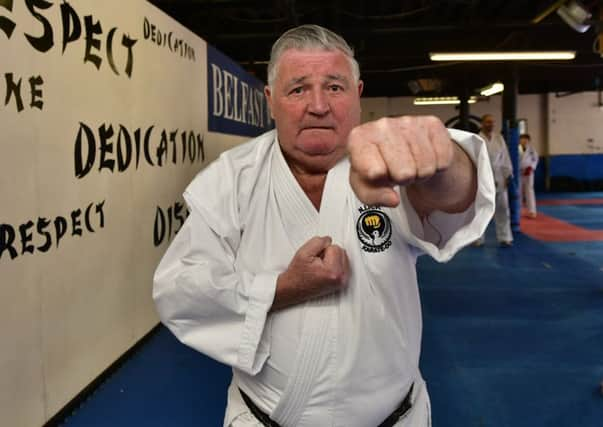

Oliver Brunton has been practising martial arts for a lifetime, or as he puts it, two or three lifetimes.
The Belfast man – who was the first person in Europe to be recognised as a seventh dan by the Japanese Karate Federation – will be 79 in July.
Advertisement
Hide AdAdvertisement
Hide AdHe is an internationally reknown practitioner in the world of karate, having gained many awards in his time as a competitor, referee, judge and examiner.
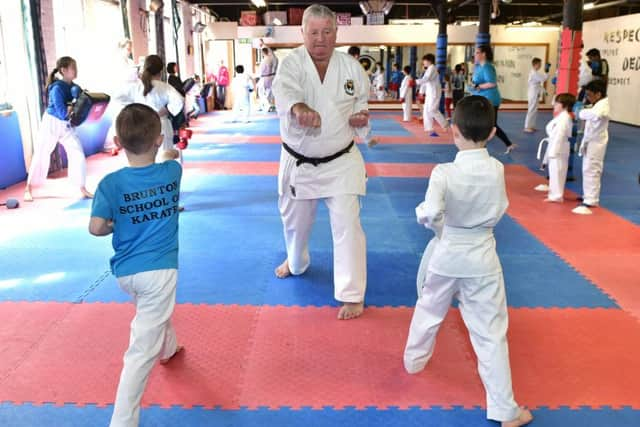

Growing up in the Sailortown area of Belfast, Oliver got involved with judo, but not before a game of street football led to a run in with the law.
He said: “I’d put my coat down for a goalpost and the police came around the corner and chased us all. You weren’t allowed to play football in the street.
“They lifted my coat and my name and address was written on it. They tracked me down and I got arrested and my father got fined 10 shillings.
Advertisement
Hide AdAdvertisement
Hide Ad“My dad wanted to get my away from the football lark. I was always interested in martial arts. He got me into judo.”
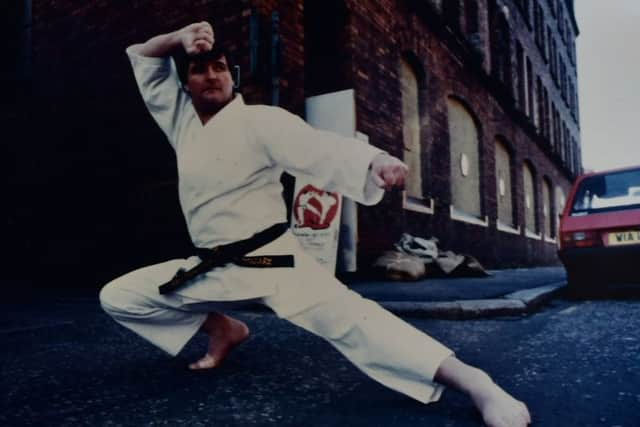

Competing in such venues as the Ulster Hall, Oliver rose to the rank of black belt, however he admits he was never that keen on judo.
“Judo was the only martial art around at the time. In the late 50s the only real judo club called Yamakwi was at Peter’s Hill (in the Shankill area).
“I was very thin and very frail at the time. All us wee bucks were getting slammed into the ground by the heavier guys.
Advertisement
Hide AdAdvertisement
Hide Ad“I went to England to work and I spotted karate over there. I started that in 1962.
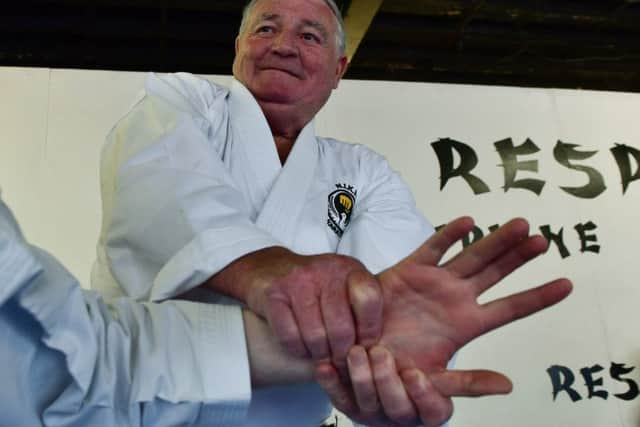

“I’d seen with karate you didn’t have to grab somebody to put them down. You could do damage by moving without making any body contact.”
Having thrown himself into karate Oliver returned to Northern Ireland and teamed up with Jim Prichard to bring karate to the Province.
He said: “Jim was from the Shankill and I was from Andersonstown. We were very close friends.
Advertisement
Hide AdAdvertisement
Hide Ad“We started the first Northern Ireland Karate Association – about half a dozen of us opened a club in Corporation Street. People came from all over. We moved to the King George VI hall in May Street.
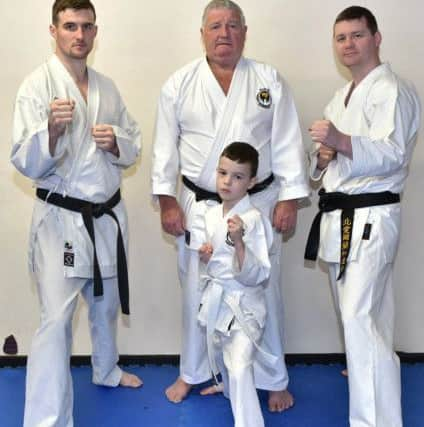

“Then the Troubles escalated and split me and Jim up.
“It was difficult to get into town. I opened clubs in Andersonstown, Jim opened clubs around the Shankill. We still kept in contact.
“My whole idea was to get a place in the centre of Belfast if we’re going to get people back together again. All I had was Catholics and all he had was Protestants. People were completely separated. They didn’t want to compete with each other.”
In 1972 the Northern Ireland Karate-Do Wado-Kai (NIKW) was opened at College Street in the city centre, the dojo in which Sensei Brunton still trains students today.
Advertisement
Hide AdAdvertisement
Hide AdOliver said: “We opened this place in 1972, the rest is history.
“I remember during the Ulster Workers Strike they turned all the electric off. We decided we weren’t going to let it beat us so we told everyone to bring a couple of candles with them.
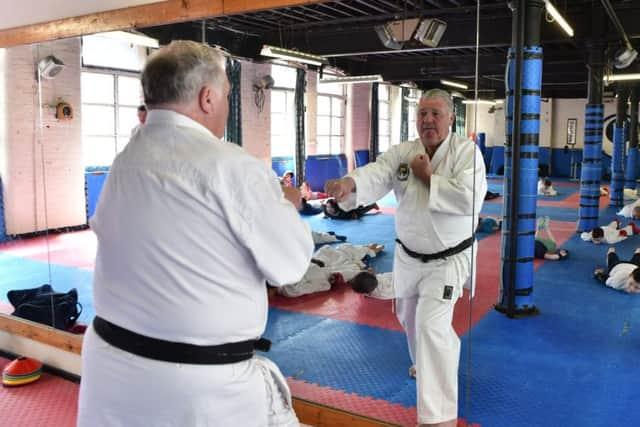

“The place was all lit by candles. It was an old wooden building, long before the days of health and safety. People were coughing and spluttering, it was a crazy thing to do, but we had a bit of light to keep on training.”
He added: “We train every night here now and on Saturdays, at that time we couldn’t afford it. We hadn’t enough members and it took time to get the people together .
Advertisement
Hide AdAdvertisement
Hide Ad“We have about 300 members now. We’ve got women, children, all sorts, shapes and sizes.”
Oliver has been given a special award for introducing people with disabilities to karate.
Of the sport of karate he said: “Karate is for everyone. People are taught discipline and determination and it is a great confidence builder.
“It’s a lifetime thing, for me it’s been two lifetimes in martial arts, maybe three.
Advertisement
Hide AdAdvertisement
Hide Ad“I knew I’d be doing it all my life. As you get older your technique gets better but you slow down physically. I couldn’t train as hard and often as some of the young kids but my knowledge and technical ability has increased immensely.
“The more detail that you put into movements you can see it makes all the difference to the technique.
“It’s built around speed, power and precision of movement. Everybody can punch and kick. The goal is to learn the technique.
All the styles of karate have got the same movements, but the technique is different. It takes years of dedication to learn the technique but the only real way to master it is to go to Japan.”
Advertisement
Hide AdAdvertisement
Hide AdThe west Belfast man spoke of the importance of his trips to the far east to reach the upper echelons of the sport of karate.
He said: “I knew that for me to be able to get on there was one thing I had to do – master the technique of the style.
“There was only one way to do that and that was to go to Japan.
“In 1984 I became an international referee for karate and became both a kumite and kata judge with the European and World Karate Federations.”
Advertisement
Hide AdAdvertisement
Hide AdOliver was appointed secretary of both these international karate bodies and held these positions for 13 years.
The World Karate Federation is the largest international governing body of sport karate, and has over 130 member countries.
The WKF has more than ten million members, and it is the only karate organisation which is recognised by the International Olympic Committee.
“As a result of being secretary I came in contact with people like (Toru) Arakawa and (Hideho) Tagaki Sensei – descendants of (Hironori) Otsuka who was the founder of the style.
“I had the chance to train with Otsuka.”
Advertisement
Hide AdAdvertisement
Hide AdOliver returned to Japan every year to train with the masters of the art and after completing a rigorous physical examination, passed to the level of seventh dan – the first European to reach this level with the Japanese Wado Association.
He is also Britain and Ireland’s only Karate-Ka to have been given the title of Shu-Ha-Ri by the president of Wado-Kai in Japan.
It is a title only reserved for those who have been through the cycle of training in the perfection of martial arts and which can only by granted by the authority of the art.
There are four different styles of karate recognised by the World Karate Federation - Shotokan, Wado, Shito-Ryu and Goju-Ryu.
Advertisement
Hide AdAdvertisement
Hide AdOliver said: “Each of them has a very unique technique, the movements are very similar, but the execution is very unique. All styles can be mixed when competing.
“I did Shotokan karate over in England and then I changed over to Wado in 1964.
“Some movements in karate are very long and very powerful and very strong, some are very light and very quick and very short. That comes from trying to change the way we do things to be able to counteract our opponent.
“People just see karate as movement, that’s where they make the mistake. The movements are nothing without the technique.”
Advertisement
Hide AdAdvertisement
Hide AdCommenting on mixed martial arts as used by organisations such as the UFC, Oliver said: “That’s just like streetfighting, like a brawl. In karate you’re trying to hit someone and not be hit yourself. If you’re going to take two or three punches to give one, you’ve lost the essence of karate and martial arts.”
Of the influences of films on people’s perception of karate he said: “I get guys come in having seen films and they say, ‘when am I going to learn to jump over a roof?’ I say, ‘when I can do it, I’ll teach you’.
In the Karate Kid that famous ‘wax on, wax off’ part – all that is to say to somebody if you’re going to learnt the technique you’re going to have to do it ah, many times. That’s true.”
Oliver also praised the virtues of karate as a means of self-defence: “That doesn’t mean you have to use it. The confidence it gives you is phenomenal. You don’t have to fight, there’s no need for it. It just means you’re not afraid.”
Advertisement
Hide AdAdvertisement
Hide AdTwo of Oliver’s three sons have followed in his footsteps into the world of karate.
James has won British Championships on numerous occasions while Oliver Junior has moved on from competitions to become an instructor.
The most recent addition to the karate family is Oliver’s eight-year-old grandson Oisin who has taken up the sport.
Oliver, whose wife has passed away, said: “My wife wasn’t really interested in karate. She supported me really well and just left me to it.”
Advertisement
Hide AdAdvertisement
Hide AdHe said: “I had two views in life - to use karate to bring people together and the other was to see it into the Olympics. The second one took longer. That’s finally going to happen in 2020.”
Oliver who is president of NI Karate will be working with the British Karate Federation to build a squad for the games.